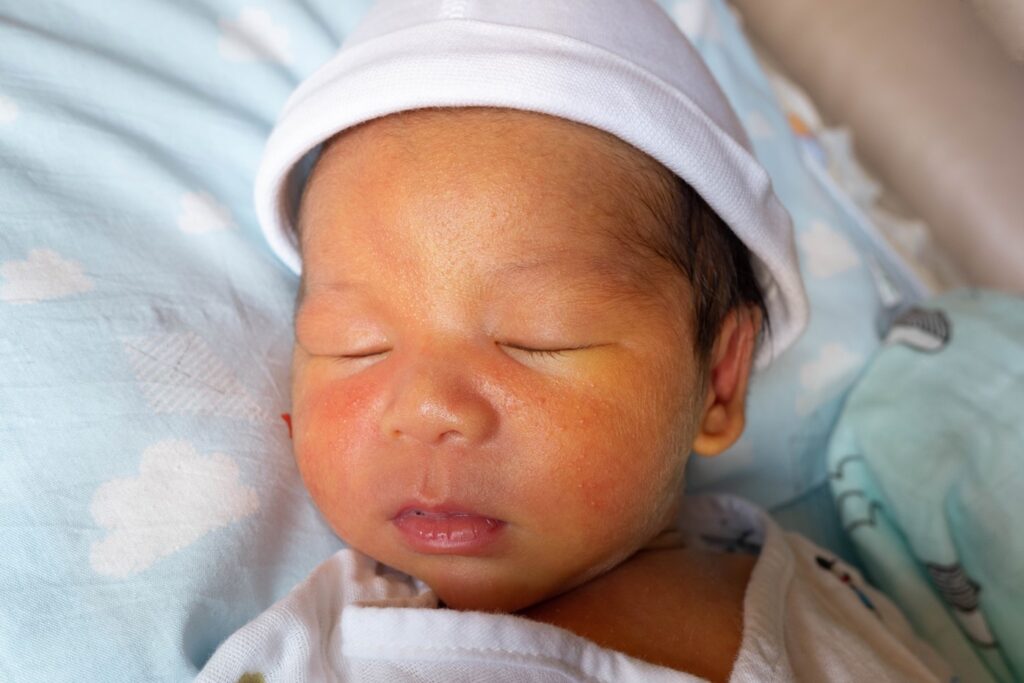Neonatal jaundice or Newborn jaundice occurs when a baby has a high bilirubin level in the blood. Bilirubin is a yellow substance created by the body while replacing the old red blood cells (RBC). The liver plays a significant role in breaking down the bilirubin so that it can be removed from the body in the stool.
In Newborns, as the liver is not fully matured, the breakdown is altered, and bilirubin is piled up in the body. A high bilirubin level makes a baby’s skin and whites of the eyes look yellow. This is called jaundice.
Approximately 60% of full-term babies develop jaundice during their first week. Almost 80% of premature babies develop jaundice during their first week.
Symptoms:
Call your doctor if you notice these symptoms:
- Yellowish skin (abdomen, arms, and legs)
- Whites of baby’s eyes turn yellow
- Low intake of milk
- Over crying
- Altered sleep patterns (no sleep or more sleep)
Common causes and risk factors:
- Premature babies (those born before 37 weeks’ gestation)
- Babies who are not getting enough breast milk or formula, either because they are having a challenging time feeding or because their mother’s milk is not in yet
- Babies whose blood type is not compatible with the blood type of their mother
Other causes include:
Severe jaundice occurs if your baby has:
- A blood infection (sepsis)
- Different blood groups from that of parents
- Bruising from a difficult birth
- High red blood cells
- Low oxygen level (hypoxia)
- Liver disorder (biliary atresia)
Diagnosis:
The doctor will check for jaundice after birth while still in the hospital. One or more tests from below are used:
- Blood test: measures the bilirubin levels. A blood sample from the baby’s heel is taken to perform this test
- Physical exam: the doctor checks your baby’s body for any signs of jaundice
- Skin test: a particular device is placed on the baby’s forehead to check the bilirubin level.
It is recommended that the Newborns must be rechecked after 3 to 5 days since birth for jaundice signs because this is when bilirubin levels are at peaks. If your baby leaves the hospital before 3 days of birth, she should be checked within the next 2 days.
Treatment:
- Mild jaundice typically goes away on its own as your baby’s liver continues to develop. This could take a couple of weeks.
- Feeding your baby more often encourages frequent pooping. This helps your baby get rid of excess bilirubin from the body.
- If your baby’s bilirubin level is high, the doctor will recommend phototherapy treatment for one or two days. Your baby will be undressed during phototherapy and placed under unique blue lights. They will wear only a diaper and a mask to protect their eyes. This treatment helps the baby in getting rid of excess bilirubin.
- Very rarely, when phototherapy does not work, your baby’s doctor may recommend an exchange transfusion. An exchange transfusion replaces some of your baby’s blood with fresh, donated blood.
Prevention
This measure will help reduce the risk of jaundice:
Breastfeed your baby frequently-
Feeding more frequently helps your baby pass more stool. The milk also gives your baby’s liver the energy required to process the bilirubin. Your baby’s stool should turn from dark green to yellow.
If you have trouble breastfeeding your baby, you must get help. It might be necessary to offer your baby supplementary formula feeds to avoid dehydration and to keep jaundice from worsening.


